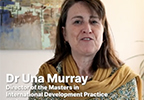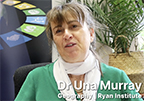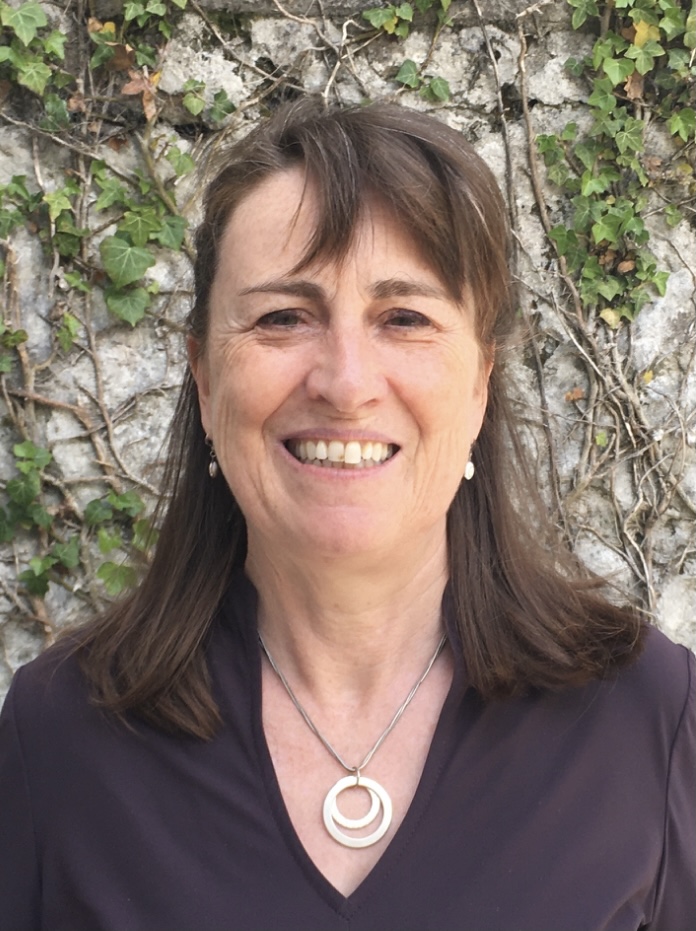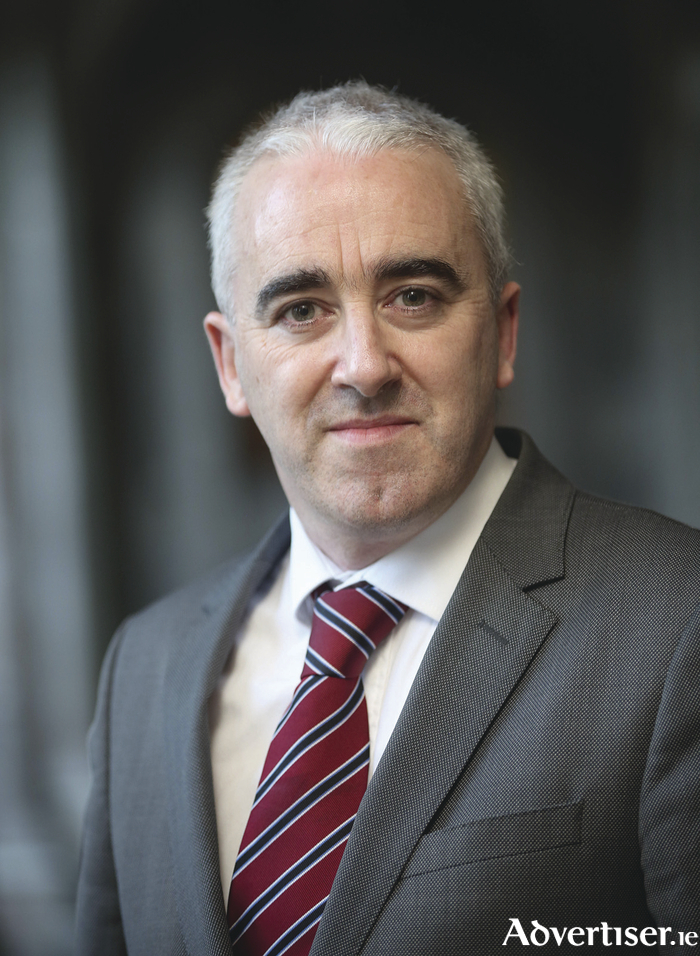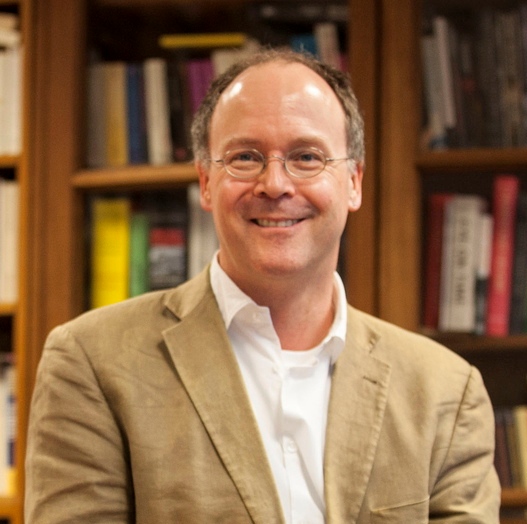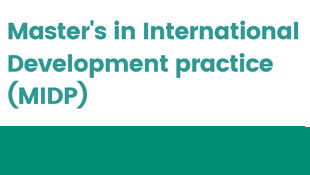-
Courses

Courses
Choosing a course is one of the most important decisions you'll ever make! View our courses and see what our students and lecturers have to say about the courses you are interested in at the links below.
-
University Life

University Life
Each year more than 4,000 choose University of Galway as their University of choice. Find out what life at University of Galway is all about here.
-
About University of Galway

About University of Galway
Since 1845, University of Galway has been sharing the highest quality teaching and research with Ireland and the world. Find out what makes our University so special – from our distinguished history to the latest news and campus developments.
-
Colleges & Schools

Colleges & Schools
University of Galway has earned international recognition as a research-led university with a commitment to top quality teaching across a range of key areas of expertise.
-
Research & Innovation

Research & Innovation
University of Galway’s vibrant research community take on some of the most pressing challenges of our times.
-
Business & Industry

Guiding Breakthrough Research at University of Galway
We explore and facilitate commercial opportunities for the research community at University of Galway, as well as facilitating industry partnership.
-
Alumni & Friends

Alumni & Friends
There are 128,000 University of Galway alumni worldwide. Stay connected to your alumni community! Join our social networks and update your details online.
-
Community Engagement

Community Engagement
At University of Galway, we believe that the best learning takes place when you apply what you learn in a real world context. That's why many of our courses include work placements or community projects.
International Development Practice (MA)
Course Overview
Implementing the UN’s Sustainable Development Goals (SDGs) is the biggest challenge facing our planet today. The dynamic MA in International Development Practice (MIDP) at University of Galway focuses on the wide-ranging social, economic, political and environmental challenges of our rapidly changing world. Spanning global concerns, from sustainable development and climate action, to food security and alleviating poverty, this MA’s focus on international development challenges enables you to develop your capacities to understand and engage with both theories and practices relating to contemporary international development as a distinct career path, with a strong emphasis on inter-disciplinarity. Given that international development challenges are multi-dimensional, they require interlinked strategies across multiple disciplines and perspectives. The programme is led by highly experienced staff who work in multilateral agencies, and have a backgrounds in human rights, policy, planning, gender, migration etc, along with practical field based research experience across many countries worldwide.
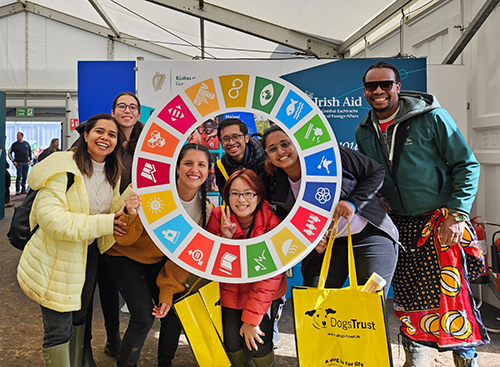
Above: MA in International Development Practice Students on a field trip to the Irish Ploughing Championship on 21 September 2023, where they met with NGOs, Irish Aid, and others to ask about how they view the SDGs.
Objectives of the Programme:
- Equip you with the theoretical and evaluative capacity to critically interrogate development policy and practice from a range of multidisciplinary perspectives.
- Develop the skills required to analyse the multi-dimensional challenges inherent in sustainable development and to work in a development programme implementation environment.
- Build competencies that are required to work professionally in an international development context/organization.
The MIDP contains core modules in development theory, policy and practice that incorporate academic, practitioner and policy orientations to link development theory and practice. Building upon this, the programme then provides a number of elective pathways through which you develop interdisciplinary expertise in key development issues, including environment, gender, human rights, food security, climate change and agriculture. Through these cross-college elective pathways you are afforded a unique opportunity to build on previous learning experiences and develop a specialised prospective career path. You will have the opportunity to combine the study of the socio-technical aspects of development practice with a reflective practice based learning experience. The programme culminates with a practice-based dissertation in which students undertake a research placement in a development organisation.
Learning Outcomes for the Programme
On the successful completion of this programme you will be able to:
- Differentiate between a range of development theories and evaluate how they relate to programmatic outcomes.
- Locate contemporary debates in international development in the context of economic and sustainable development discourses, policy positions and processes.
- Compare, categorise and critique international development institutions such as government agencies, United Nations organisations, non-governmental organisations (NGOs), philanthropic foundations, and consultancy firms engaged in international development practice, and be able to evaluate their work in terms of impact.
- Apply a range of research methods, perspectives and critical thinking to contemporary international development issues.
- Apply problem-solving, project planning, and management skills to the implementation and evaluation of development initiatives.
In sum, on the MIDP, you will acquire expertise via three core, interlinked pedagogical components—development theory, development policy, and development practice – along with the opportunity to specialise in a range of development practice sectors, including science, human rights, data analytics and project management. In addition, a key research placement element will equip you with vital on-the-ground experience of development practice.
Online learning: there are options for on-campus or on-line mode of delivery in semester 2.
Applications and Selections
Entry to the programme is based on competitive selection. Applications are made online via the University of Galway Postgraduate Applications System. See supporting documents requirements here.
Who Teaches this Course
- Professor Charles Spillane
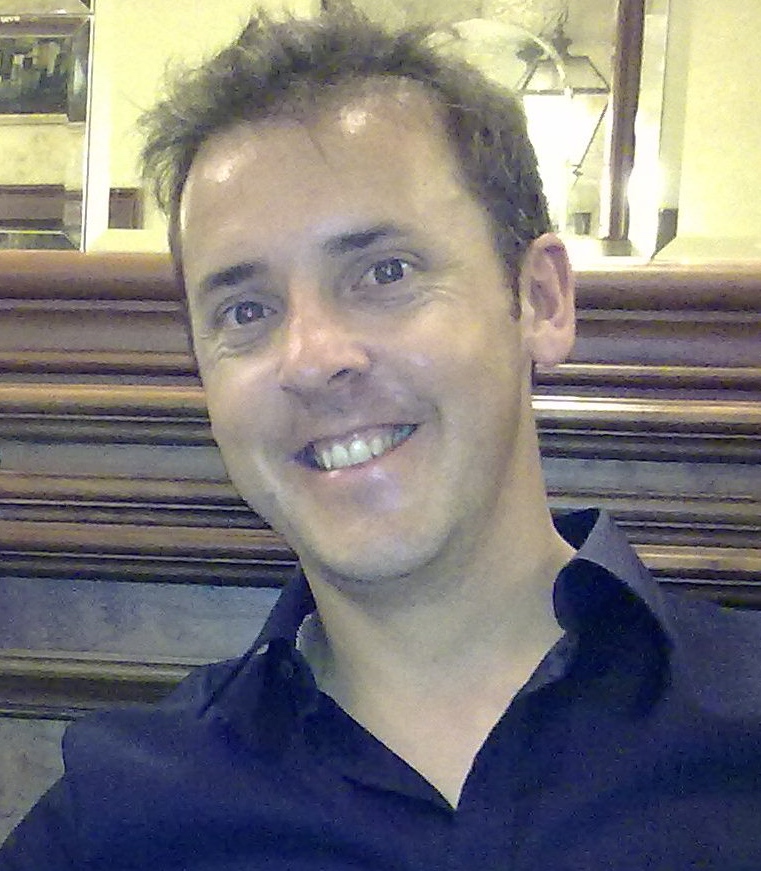
Room 111 Geography
University of Galway
University Road
Galway H91 TK33
View Profile
Requirements and Assessment
IELTS score: If you have not studied through English before you will need an English language qualification by the time your register from within the last two years such as IELTS 6.5 (with not less than 5.5 in any one component).
NQAI Level 8 honours degree or equivalent to a minimum standard of Second Class Honours, Grade 1 or equivalent in an appropriate discipline is required.
Key Facts
Entry Requirements
An upper second class degree in wide range of areas, including social or economic sciences, environmental sciences, management, business, health, human rights, engineering or sciences. In other circumstances, those with a lower degree grade or who have relevant work experience in the field of international development will be considered.
Please also see the University’s Recognition for Prior Learning Policy.
Additional Requirements
Recognition of Prior Learning (RPL)
Students who don’t have the necessary academic requirements may apply subject to the University’s Recognition for Prior Learning Policy. Depending on experience in the field, or in the international development arena, and ability to write in English, we will be able to consider applications for Recognition of Prior Learning.
Duration
1 year, full-time
Next start date
September 2025
A Level Grades ()
Average intake
25
QQI/FET FETAC Entry Routes
Closing Date
See Key Dates website for information.
NFQ level
Mode of study
Blended Learning
ECTS weighting
90
Award
CAO
Course code
MA-IDP
Course Outline
The MIDP will provide the platform to build on your enthusiasm to instigate and lead change, while positioning careers in this domain. You are offered a range of modules that challenge them to examine concepts of ‘development’ using core conceptual and practical debates of contemporary international development. You will encounter a wide variety of teaching methods. Modules will include web-based learning, lectures, exercises, seminars, excursions and Programme outline group/project work.
The core modules in semesters 1 and 2 that make up 40 ECTS include:
- An introduction to development, covering international development theories and frameworks
- International development policy and practice including project management (formulation, appraisal, monitoring and evaluation), and covering a range of actors and development policies
- Data analytics and statistics for social scientists, so students can critically analyse data for development practice
- A development perspectives seminar series featuring invited international development practitioners from the UN, NGOs, research agencies
- Research communications for development, where students learn to develop their own website and critique sources of international development information.
You then choose from a large range of thematic elective modules to make up a total of 20 ECTS. The thematic pathways are:
- Climate change, agriculture and food security
o Modules options include policy and scenarios for climate change adaptation and mitigation, climate change nutrition and global health, natural resources and livelihoods and
gender and climate change.
- Development, security and governance
o Module options include geopolitics and security, a historic analysis of NGOs, development and justice concepts and practice
- Human Rights
o Modules options include international human rights law, international humanitarian law, migration law, business and human rights, gender and human rights, international
refugee law, minority rights and rights of indigenous peoples
- Gender
o Modules options include gender and conflict, gender sexuality and global health, applied gender analysis and policy, gender perspectives on globalization, human rights,
women and gender.
- Sustainable development practice
o Modules options include social marketing and sustainability, an introduction to sustainable business, designing a sustainability research fellowship proposal, writing peer-
reviewed research articles on sustainability issues.
Some pathways allow for off-campus learning in semester 2.
Online learning: there are options for on-campus or on-line mode of delivery in semester 2.
Students will complete a 30 ECTS Research Project in collaboration with an international organisation or a international development research project.
Curriculum Information
Curriculum information relates to the current academic year (in most cases).Course and module offerings and details may be subject to change.
Glossary of Terms
- Credits
- You must earn a defined number of credits (aka ECTS) to complete each year of your course. You do this by taking all of its required modules as well as the correct number of optional modules to obtain that year's total number of credits.
- Module
- An examinable portion of a subject or course, for which you attend lectures and/or tutorials and carry out assignments. E.g. Algebra and Calculus could be modules within the subject Mathematics. Each module has a unique module code eg. MA140.
- Subject
- Some courses allow you to choose subjects, where related modules are grouped together. Subjects have their own required number of credits, so you must take all that subject's required modules and may also need to obtain the remainder of the subject's total credits by choosing from its available optional modules.
- Optional
- A module you may choose to study.
- Required
- A module that you must study if you choose this course (or subject).
- Required Core Subject
- A subject you must study because it's integral to that course.
- Semester
- Most courses have 2 semesters (aka terms) per year, so a three-year course will have six semesters in total. For clarity, this page will refer to the first semester of year 2 as 'Semester 3'.
Year 1 (90 Credits)
OptionalPAB5102: Climate Change, Agriculture, Nutrition & Global Health - 5 Credits - Semester 1OptionalPAB5103: Policy & Scenarios for Climate Change Adaptation & Mitigation - 5 Credits - Semester 1
OptionalPAB5104: Gender, Agriculture & Climate Change - 5 Credits - Semester 1
OptionalTI6126: Critical Geopolitics and Security - 10 Credits - Semester 1
OptionalLW5111: Business and Human Rights 2 - 10 Credits - Semester 1
OptionalLW5114: International Refugee Law - 10 Credits - Semester 1
OptionalLW471: International Humanitarian Law - 10 Credits - Semester 1
OptionalLW5116: Gender and Human Rights - 10 Credits - Semester 1
OptionalPAB5132: Sustainable Development Communication Skills - 5 Credits - Semester 1
RequiredDEV6105: Contemporary International Development Perspectives II - 10 Credits - Semester 1
RequiredDEV6104: Practical Research Project - 30 Credits - Semester 1
RequiredDEV6100: International Development Policy and Practice - 10 Credits - Semester 1
RequiredTI6125: Research Methods and Mapping - 10 Credits - Semester 1
RequiredTI6131: Introduction to Development - 10 Credits - Semester 1
OptionalPAB5108: Climate Change, Natural Resources & Livelihoods - 5 Credits - Semester 2
OptionalTI6128: Development and Justice - 10 Credits - Semester 2
OptionalDJ6139: Humanitarian Communication - 10 Credits - Semester 2
OptionalGG106: Women, Conflict and Human Security - 5 Credits - Semester 2
OptionalGG6109: Gender, Sexuality and Global Health - 10 Credits - Semester 2
OptionalGG113: Applied Gender Analyses - 5 Credits - Semester 2
OptionalGG6103: Development and Human Rights - 5 Credits - Semester 2
OptionalDJ6144: Communicating Climate Action and Science - 10 Credits - Semester 2
OptionalTI6146: Children and Young People's Worlds - 10 Credits - Semester 2
OptionalDJ6137: Strategic Communication - 10 Credits - Semester 2
OptionalENP6103: ENLIGHT University Alliance PG (S2) - 5 Credits - Semester 2
OptionalENP6101: ENLIGHT University Alliance PG (S2) - 10 Credits - Semester 2
RequiredDEV6102: Data Analytics for Social Sciences I - 5 Credits - Semester 2
Why Choose This Course?
Career Opportunities
The MA in Development Practice enables students to develop their skills so they are competitive for distinct career paths in international development institutions. This includes potential careers within UN agencies (such as the ILO, FAO, UNICEF, IOM etc), international NGOs (e.g., Concern, Oxfam, etc.) or bilateral aid organisations. Some students may want to pursue careers in research institutes, for example as PhD students or Research Assistants. Other students may seek careers in companies or foundations which have an international development component. The combination of theoretical knowledge with a practical focus on skills (such as project planning, monitoring and evaluation, economics, data analytics, statistics, etc.) will position you for a vibrant career in international development and allow you to engage robustly in discussions related to global development.
Who’s Suited to This Course
Learning Outcomes
Transferable Skills Employers Value
Work Placement
Study Abroad
Related Student Organisations
Course Fees
Fees: EU
Fees: Tuition
Fees: Student levy
Fees: Non EU
For 25/26 entrants, where the course duration is greater than 1 year, there is an inflationary increase approved of 3.4% per annum for continuing years fees.
Postgraduate students in receipt of a SUSI grant – please note an F4 grant is where SUSI will pay €4,000 towards your tuition (2025/26). You will be liable for the remainder of the total fee. A P1 grant is where SUSI will pay tuition up to a maximum of €6,270. SUSI will not cover the student levy of €140.
Note to non-EU students: learn about the 24-month Stayback Visa here.
Find out More
Dr Una Murray
T: +353 91 495 908
E: una.murray@universityofgalway.ie








